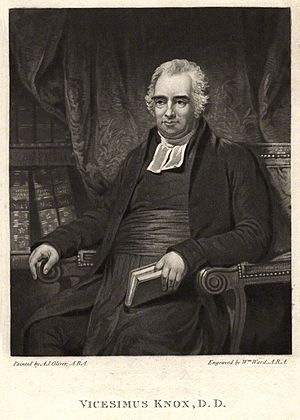Vicesimus Knox facts for kids
Vicesimus Knox (born 1752, died 1821) was an English writer, school headmaster, and a priest in the Church of England. He was known for his essays on morals and literature, and for speaking out against war.
Life Story
Vicesimus Knox was born on December 8, 1752, in Newington Green, Middlesex. His father, also named Vicesimus Knox, was a priest and schoolmaster.
Knox went to St John's College, Oxford, starting in 1771 and finishing his studies in 1775. His father became the headmaster of Tonbridge School in 1772. After college, Knox became a Fellow (a type of academic position) at his college. He became a deacon in 1775 and a priest in 1776.
In 1778, Knox took over from his father as headmaster of Tonbridge School. His father was not well. Knox was very successful and helped the school grow a lot. The number of students went from about 20 to around 80. Some of his students included Charles Girdlestone and John Mitford.
Later, in the 1790s, Knox wrote articles for the Morning Chronicle newspaper. In these articles, he criticized Britain's foreign policy, especially its actions towards France and Poland. Because his views were not popular, the number of students at Tonbridge School went down again.
Knox also held several church positions, called "livings." These included Shipborne (from 1800), Ramsden Crays (from 1801), and Runwell (from 1807).
His Ideas
As a writer, Knox wrote a lot about good behavior (morals) and books (literature). As a priest, he often gave sermons (speeches) supporting good causes and speaking out against war.
Against War
Knox strongly believed that war was wrong. He wrote that if people truly followed the Christian religion, there would be no more wars. He thought that ending all wars and creating lasting peace was one of the most important things anyone could ever do.
He said:
"If the Christian religion in all its purity, and in its full force, were suffered to prevail universally, the sword of offensive war must be sheathed for ever, and the din of arms would at last be silenced in perpetual peace."
And also:
"The total abolition of war, and the establishment of perpetual and universal peace, appear to me to be of more consequence than any thing ever achieved, or even attempted, by mere mortal man, since the creation."
On Novels
Knox also had strong opinions about novels. In one of his essays, "On Novel Reading," he suggested that the many novels being published might be making society worse. He worried that reading adventure novels like Gil Blas could make a schoolboy lose interest in classic Latin books.
He also linked "sentimental novels" (books focused on feelings and emotions) to bad habits. He was an early critic of writer Laurence Sterne and did not like the morality in Sterne's book A Sentimental Journey Through France and Italy. Knox preferred travel writing over these types of novels.
His Writings
Vicesimus Knox wrote many books and essays. Here are some of his well-known works:
- Essays Moral and Literary: A collection of his thoughts on morals and literature. It was very popular and went through many editions.
- Liberal Education, or a Practical Treatise on the Methods of acquiring Useful and Polite Learning: This book was about how to get a good education.
- Elegant Extracts: These were collections of interesting and useful passages from prose (regular writing) and poetry. He made them for students to help them learn to speak, read, think, and write better.
- Winter Evenings, or Lucubrations on Life and Letters: Another collection of his essays, often written as if he was thinking deeply during winter evenings.
- Elegant Epistles: A collection of interesting letters, chosen to help young people learn and for general entertainment.
- Family Lectures, or Domestic Divinity: A collection of sermons from different religious leaders, which Knox edited for use in schools.
- Sermons, chiefly intended to promote Faith, Hope, and Charity: His own collection of sermons.
- Personal Nobility, or Letters to a young Nobleman on the Conduct of his Studies and the Dignity of the Peerage: A book of advice written to a young nobleman.
- Antipolemus, or the Plea of Reason, Religion, and Humanity against War: This book included parts translated from the famous writer Desiderius Erasmus. Knox added a long introduction arguing against war, especially the war between Britain and France at the time.
- The Spirit of Despotism: This book criticized unfair power and control. It was first printed privately and later became more widely known.
- Christian Philosophy, or an Attempt to Display the Evidence and Excellence of Revealed Religion: A book exploring the ideas and strengths of Christianity.
He also wrote single sermons and edited classical texts like Juvenal and Persius and Catullus.
Family Life
In 1778, Vicesimus Knox married Mary Miller, who passed away in 1809. They had several children:
- Holles Josiah, who died when he was young.
- Vicesimus (died 1855), who became a lawyer.
- Thomas (1784–1843), who followed in his father's footsteps and became headmaster of Tonbridge School in 1812.
- Sarah.
 | Janet Taylor Pickett |
 | Synthia Saint James |
 | Howardena Pindell |
 | Faith Ringgold |


